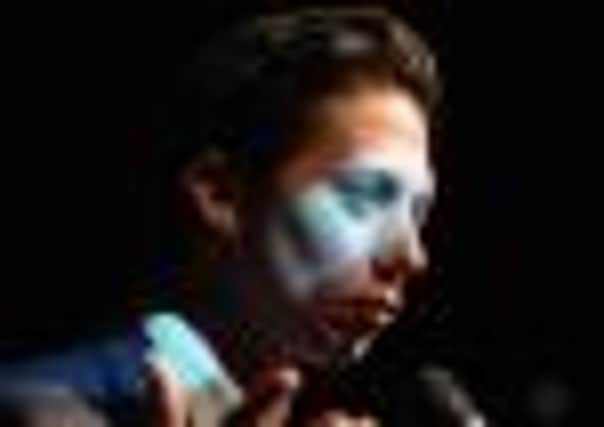Peter Ross: The bloodsport of slam poetry


‘LAY-DEEZ and gentlemen! Welcome to Literary Death Match!” Down a dark lane, in the ornate upstairs room of an Edinburgh pub, Adrian Todd Zuniga – a young American who somehow manages to look at once cherubic and cadaverous – is introducing the latest in a wave of live spoken word events which are sweeping the nation’s capital.
Dressed in a dark suit, tie askew, a giddy flash of polka-dot socks above dagger-sharp suede brogues, Zuniga epitomises a certain type of bookish chic, as do the four Scottish writers – two men, two women – who have come here tonight to compete against one another, reading their poetry and short fiction in the hope of impressing judges and audience. “I want a good clean round,” Zuniga warns. “No dangling participles, and keep your exclamation points under control.”
Advertisement
Hide AdAll the writers are pretty good, but a special word, perhaps, for Andrew C Ferguson, a 50-year-old Fifer whose combination of tweed waistcoat and skull ’n’ crossbones cravat has already marked him out as one to watch. This impression is confirmed by his hilarious short pastiche, The Slime Of Miss Jean Brodie, which reimagines the teacher of Muriel Spark’s novel as a many-tentacled beast perched atop Marcia Blaine School and devouring staff and pupils.


Ferguson, who lives in Glenrothes and works in local government, is part of the spoken word performance group Writer’s Bloc, and wrote sci-fi until he reached the limit of his scientific knowledge (a biology higher gained, in 1979, from Auchmuty High) since which point he has focused on horror and dark fantasy. His story Isabel Allende Goes To The Cowdenbeath Game has been performed across Scotland to great acclaim though never, for some reason, in that douce burgh itself. What, then, is his tip for winning over an audience? “Alcohol,” he considers, “usually helps.”
Drink, at Literary Death Match, is taken in liberal quantities by an audience of liberals who, by the final round, are ready for just about anything. What they get is a version of Play Your Cards Right with literati instead of face cards; Daniel Handler – better known as Lemony Snicket – is the joker. On a previous occasion, the winner was decided by throwing crumpled pages of War And Peace through a basketball hoop. It is all a far cry from the traditional idea of the book event with its tepid Chardonnay, obvious questions and polite applause.
“This is totally crazy. I love the anarchism of it,” says one audience member, Andrew Sclater, a 63-year-old Stockbridger with his left arm in a stookie after falling over on Burns night, an incident he insists was not whisky-related. He is a dry-stane dyker, having previously worked as an editor of Charles Darwin’s letters, precisely the sort of career path that one might expect from a regular punter on the live poetry circuit.
Literary Death Match is just one of several such nights in Scotland, especially in Edinburgh, which are part of a booming spoken word scene: TenRed at The Persevere in Leith; Blind Poetics at the Blind Poet; Rally & Broad at The Counting House; Inky Fingers at The Forest; Illicit Ink at the Bongo Club; Shore Poets on Lothian Road; Neu Reekie at Summerhall, a night which is itself named after the late performance poet Paul Reekie.


That is by no means an exhaustive list, and each is different, some offering open mic slots, others a mix of newcomers and established names, and others still music and cabaret in addition to live poetry. It is notable, too, that these nights have a dedicated audience with a wide age range. There were 80 people at the Voodoo Rooms for Literary Death Match, mostly younger hipster types with thick-lensed glasses and boho (or in some unfortunate cases, hobo) hair. As grassroots live music continues to struggle in Edinburgh, largely from a lack of small, cheap venues, poetry seems to be flourishing. But why? What’s the attraction?